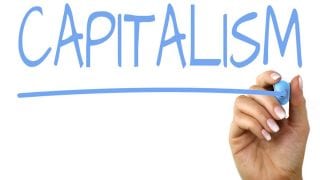Financial markets enjoyed two significant milestones last week.
The first one occurred in the United States. The other happened across the Pacific Ocean in the Land of the Rising Sun, Japan.
In the United States, the NASDAQ hit its first new all-time high since the dotcom bubble peaked in the year 2000.
In Japan, the benchmark Nikkei 225 closed above 20,000 for the first time since March 2000.
The gains in the Japanese stock market have been particularly robust, with Japanese stocks near the top of the 46 global stock markets I monitor daily at my firm Global Guru Capital.
NOTE: Global Guru Capital is a Securities and Exchange Commission-registered investment adviser, and is not affiliated with Eagle Financial Publications.
As of yesterday’s close, the unhedged bet on Japan — the Japan Index MSCI iShare ETF — is up a cool 18.15%.
The WisdomTree Japan Hedged Equity Fund (DXJ), a fund that’s pegged to the Japan market and also effectively hedges out the negative impact of a falling yen relative to the U.S. dollar, also delivered nicely for subscribers to my Bull Market Alert advisory service.
It was last Nov. 2 that I recommended subscribers add DXJ to their portfolios. At that time, the fund traded at a dividend-adjusted $49.34. As of Monday’s close, shares traded at $57.91, which translates into a solid gain of 17.4%.
The good news is that those kind factors are still in place, even as other positive factors emerge to support the stock market surge in the Land of the Rising Sun.
Fueling the Japanese Equity Flame
As I wrote in November, a remarkable divergence surfaced between the monetary policies of the central banks of the United States and Japan.
The very same week the Federal Reserve shut down “QE4,” with its announcement that its bond-buying program had ended, the Bank of Japan (BoJ) fired up its printing presses to inject trillions of yen more into its financial system.
The BoJ’s move last November was a big surprise, both in terms of its timing and its size. Overnight, the BoJ upped its annual target for expanding the monetary base from 60 to 70 trillion yen to 80 trillion yen ($724 billion).
To put that in perspective, this meant that the BoJ was now committed to purchasing the equivalent of more than double the amount of new bonds actually issued by the Japanese government.
To use Ben Bernanke’s famous metaphor, it was like throwing money out of helicopters to stimulate the economy.
If that weren’t enough, the Japanese Government Pension Investment Fund, the world’s largest pension fund with approximately $1.1 trillion in assets, announced that it was increasing its allocation to stocks. The fund boosted the overall equity allocation to 25% from the previous allocation of 12%.
While I thought betting on the Japanese stock market going up was a no brainer, I caught a lot of flak from folks who disagreed with my analysis.
And besides, weren’t the Kyle Basses of the world actually shorting Japan?
These arguments struck me as odd.
After all, no stock market on the planet ever saw a quantitative-easing (QE) program it didn’t like.
And like a lot of folks who “made millions by predicting the mortgage crisis,” Kyle Bass has turned out to be a one-hit wonder.
For me, having seen the non-inflationary impact of QE on the U.S. stock market over the past five years, betting on Japan was simply the case of “wash, rinse and repeat.”
This same analysis, by the way, applied to my big bet on Europe and Germany for 2015.
Stay Tuned, There’s More to Come
The question now is whether, given the strong run higher in DXJ during the past five-plus months, you can expect more upside by betting on Japan.
The short answer is yes, and here’s why.
First, the BoJ’s QE program ensures that more yen will be chasing the same amount of securities. And that means higher prices in yen.
With the BoJ committed to buying a massive 12 trillion yen ($100 billion) of sovereign bonds a month, and with the Pension Investment Fund pouring huge capital into Japanese equities each month, prices couldn’t help but go up.
As Jim Rogers observed, “You can’t revoke the law of supply and demand.”
As long as you hedge out the devaluation of the yen versus the U.S. dollar (as DXJ does), you’re off to the races.
Second, there’s the issue of politics. For Japan, the massive QE program is more than just a technocratic effort to kick-start its economy. And “Abenomics” is now more than just the “three arrows” of monetary stimulus, fiscal stimulus and structural reform packaged together as a new economic policy.
It’s more like an all-in gamble engineered to both validate the honor of Japan’s Prime Minister Shinzo Abe and his government’s attempts to extricate the country from a two-decade economic slump exacerbated by a deflationary spiral.
Last week, there was some real evidence that Abe’s policies are having a material affect on more than just Japanese stock prices.
On Wednesday, Japan reported its first monthly trade surplus since June 2012. Global exports were up 8.5% while imports were down 14.5%.
Although lower global oil prices explained a good chunk of Japan’s first trade surplus in nearly three years, the data also suggests that Abenomics is starting to have a positive effect on the real economy in Japan.
The impact of any QE program on a “real” economy remains unclear and probably disappointing in the long run. The only really clear impact is higher stock prices and a devaluing currency.
Yet if there are some green shoots sprouting in the Japanese economy, Abenomics will take the credit. That in itself will continue to make Japan more attractive to return-hungry international investors.
The bottom line?
I think there’s more upside to come in Japan.
In case you missed it, I encourage you to read the e-letter column from last week about three surprisingly successful markets in 2015. I also invite you to comment in the space provided below.

![[Japanese Prime Minister Shinzo Abe]](https://www.stockinvestor.com/wp-content/uploads/9092387608_22a3c3fa41_b.jpg)


